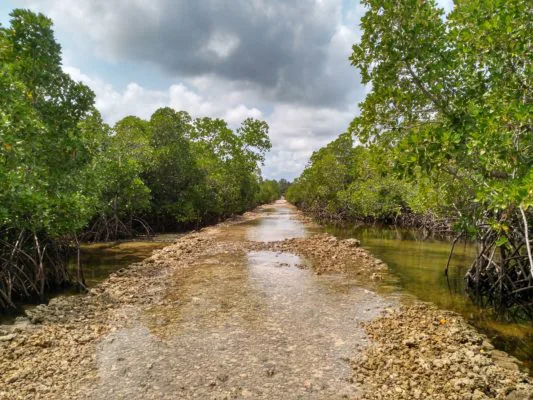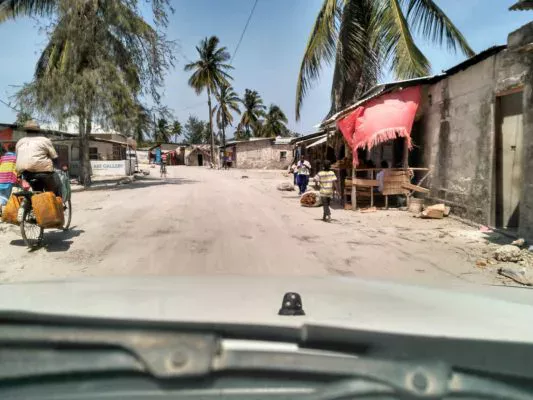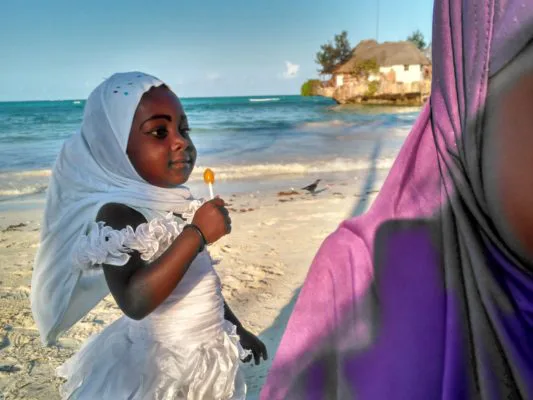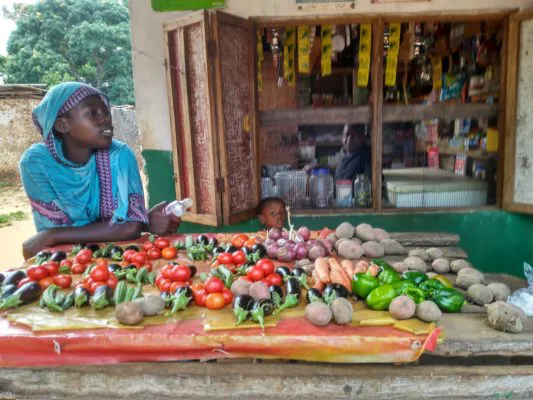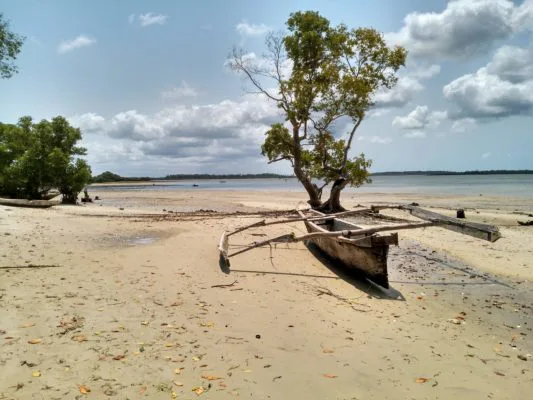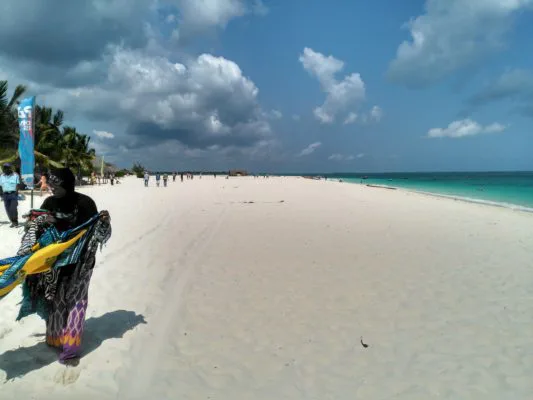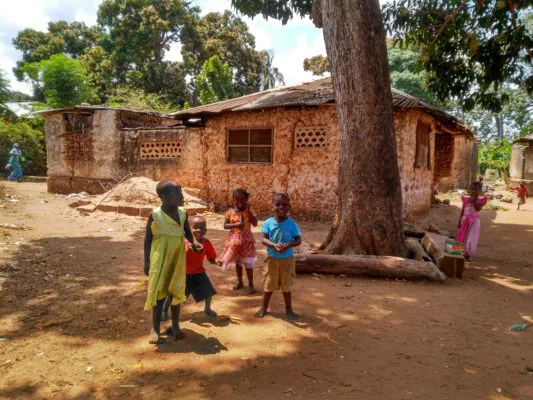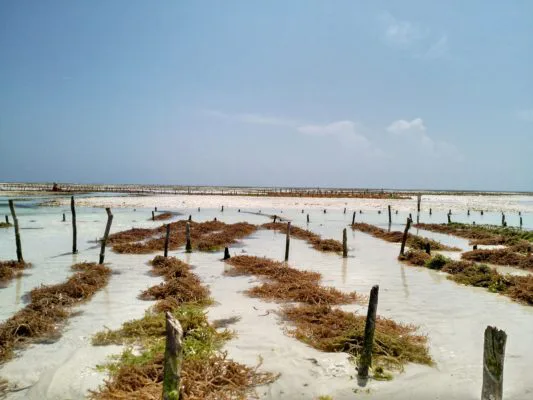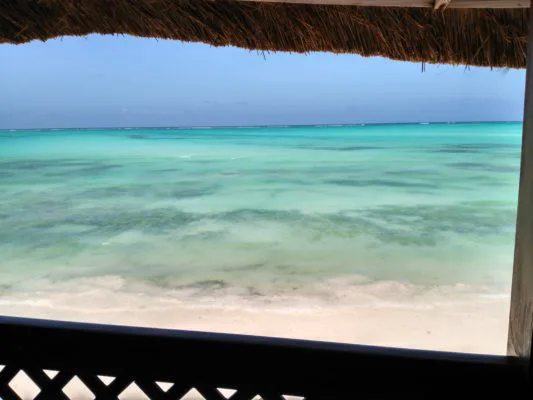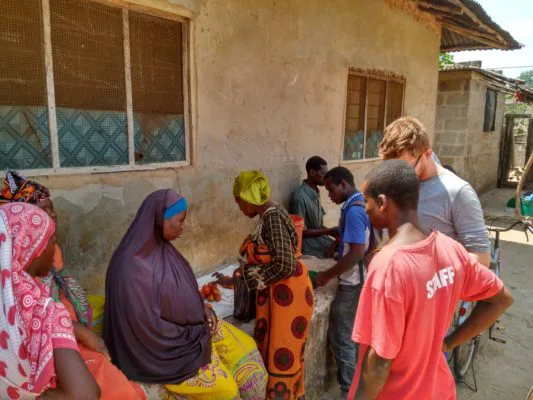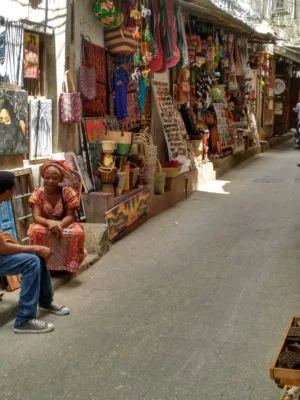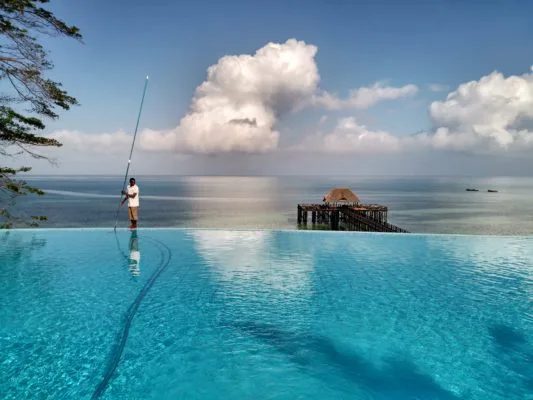10 Things to Know Before Traveling to Zanzibar (…and How to Deal With Them)
1. Entry
For the entry to Zanzibar no visa must be applied for in advance; (much too expensive and too complicated!) one receives this simply and uncomplicatedly at the counter in the arrival hall. The visa costs USD 50,-/person and is valid for 90 days. The visa can be paid either in Euro (then it costs also €50,-), in American Dollar or with the credit card. Depending on who is sitting at the counter and what day it is, payment is ONLY possible with credit card or ONLY cash.
Therefore: have both credit card and cash ready.
There is no luggage conveyor belt at the airport, the suitcases are carried into the hall by porters and placed on a pile. Tipping the porters is not a must, but is of course appreciated. After the luggage has been screened, after about 10 meters you are standing outside, where again porters want to take your suitcases. From the exit to the transfer bus it is about 20 – 30 meters.
Therefore: If you don’t want to pull your suitcases yourself and/or want to do something good, give the guys 1-2 dollars. The porters in Zanzibar get no salary and live on tips.
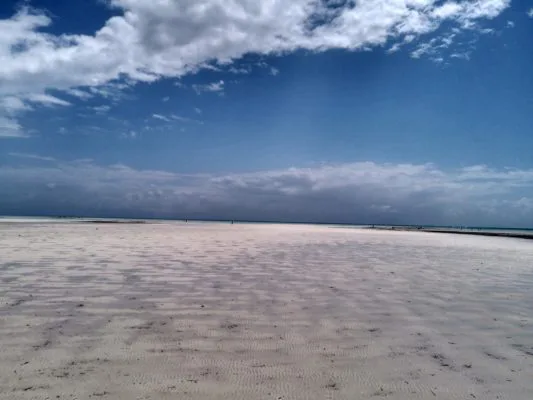
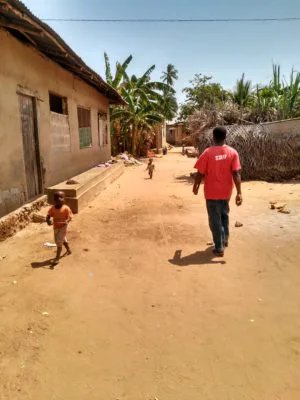
2. Moving Around
There are 5 ways to get around Zanzibar:
By rental car
Driving a car in Zanzibar is possible but not straightforward. To rent a car you need an international and a Tanzanian driving license, which will be issued to you by the car rental company on site (passport photos + USD 12,-). Once you have the car, the following challenges await you: bad road conditions, suicidal chickens, cows, ducks, goats and many Zanzibaris walking along the road on the verge (there are no sidewalks). Your biggest problem, however, will be the police, who will try to take as many dollars as possible out of your “mzungu” pockets.
Therefore: if the police stops you: slow down, signal! and pull over nicely on the left. Since our friend and helper will most likely find something you did wrong as an ignorant tourist, you can try the following: Offer to drive them somewhere (“I give you lifti”) – most policemen on Zanzibar don’t have a car. Offer food or drinks that you are carrying, call the car rental company and ask for help or take pictures/video of the policeman with the threat to send them to the police chief. If nothing helps or you want to save yourself long discussions, bite the bullet and pay a small amount. Do not accept sums like USD 120,-, but offer to settle the whole thing by hand. („We can arrange this friendly“). The policeman puts a notebook on the passenger seat and looks briefly in the other direction. You put the money in the book and that’s it. 10,000 Tanzanian shillings are perfectly sufficient (USD 5).
on Foot
The streets have no sidewalks and some are in very poor condition. There are no walking paths and most of the hotels are far from civilization. Apart from that, it is usually too hot to walk long distances.
Therefore, walking I recommend only for nice, long walks on the beach.
by Dala-Dala
The only public transportation on the island. Dala-dalas are small 16-seater buses that are open at the back and sides and usually covered only with a tarpaulin or with a wooden board. Those who want a ride stand by the road and raise their hand. Where the buses go is revealed by a number on the driver’s cab.
Therefore: it is best to ask the driver where he is going. The ride with the Dala-Dala should be seen more as an adventure than a cheap means of transportation. The car stops every 20 meters and if there is no more room inside, you stand on the back bumper and hold on to the wooden roof – and off goes the fun ride. Who dares the adventure: with 1-3 dollars per way, a very cheap alternative to the cab.
by cab
Cabs are very expensive in Zanzibar. This is partly justified, as gasoline prices are exorbitantly high. For a ride from Kiwengwa or Nungwi to Stone Town, you have to calculate about USD 50,- per way.
Therefore: if possible, avoid long cab rides. For short distances the cab is well suited. The cabs have fixed prices, nevertheless you should ask for the price before the trip.
With private driver or guided tour.
The safest, most comfortable but of course the most expensive option.
3. Religion
95% of the Zanzibari population belongs to Islam. The men usually wear long pants with a shirt or a caftan, the women dress with skirts and beautiful, colorful scarves, which you wrap skillfully around your body. They also usually cover their hair with the hiyab, which girls often wear as children. The muezzin calls his prayer 5 times a day. In the classic vacation hotels on the beach in Nungwi and Kiwengwa you will not hear any of this. In the hotels in Stone Town such as: the Park Hyatt and the Serena Inn, you will hear the prayers.
Therefore: when going to Stone Town, women should cover knees and shoulders, the men, if possible, wear knee-length pants. Gestures of affection towards each other should be avoided, during Ramadan please do not eat or drink anything in the streets and behave politely and respectfully towards the population. Just as we expect from guests who visit our country.
4. Trips
Excursions with the tour operator cost between USD 75,- and USD 120,- per person. Private tours come to about USD 250,-/car. If you are a group of four, booking a private tour with a guide will usually cost you the same as a guided bus tour in a larger group. It is even cheaper if you simply rent a driver for a day at the hotel or from the tour guide. Most Zanzibari who work in tourism speak quite good English. They are not trained guides, but they know their island like the back of their hand and are happy to take you to places off the beaten track.
Where to book? As a former employee of a large tour operator, I have to tell you: book with the tour operator. You are in good hands and insured. As a private person, I also book more often in the cheaper small stores that you can find on many public beaches. Directly at the beach boys on the beach I would personally rather not book, although I have also received good feedback from my guests but also very bad.
Therefore: compare prices and then weigh safety with risk.
5. Weather
The best time to travel with the most sunny days is December, January, February, March to mid-April. The remaining months are rainy season, although it does not rain the whole time. In my year in Zanzibar, May and November were very rainy. The sun was hardly visible in these two months, even if it did not rain. The remaining months it was relatively much cloudy, but the temperatures were always above the 20 degrees limit, a light jacket or a scarf around the shoulders needed in the evening only rarely.
Personally, I noticed that the weather on the east side was usually better than on the west side. Maybe no meteorologist will confirm this, but whenever it was cloudy in Nungwi, the sun was shining in Kiwengwa. (Why you should still choose an accommodation on the west side, you can read under the point “tides”).
Therefore: if you book in the high season, you don’t have a guarantee for good weather, but the chances for many sunny days are much higher than in the European summer months.
6. Poverty, crime and corruption
Poverty:
Unemployment in Zanzibar is high, wages low. A well-earning Zanzibari working in tourism receives USD 400/month, for others this is the average annual wage.
Nevertheless, you will hardly see begging people. The land is very fertile, many families are mainly self-sufficient; what they have too much of, they sell on the market. Yes, life is hard in Zanzibar, but you can hardly see that in the people there. The Zanzibari live from one day to the next. They enjoy what they have and support each other in difficult times.
Therefore: do not be shocked because of the “poor” people in the mud huts. Many people in Europe have much more money, but are much less happy than the Zanzibari. You will see!
Crime:
The crime rate is surprisingly low. In my year in Zanzibar, there was not a single assault or theft among my guests or me. Stone Town is somewhat to be enjoyed with caution at night; especially as a woman one does not feel quite so comfortable there in the dark. Also, one should give a wide berth to demonstrations and situations where the population makes your own laws.
Therefore: inform yourself before booking on the website of the Foreign Office. Ask the local tour guide whether all excursions, especially those to Stone Town, are currently safe – especially when elections are taking place.
Corruption
From traffic police to airport personnel to the highest offices – corruption is omnipresent in Africa and something of an open secret. Stone Town is a UNESCO World Heritage Site and receives millions in funding from UNESCO. Where does this money go? At least not into the preservation and renovation of the many old, beautiful buildings that are slowly falling apart. If you drive by the Presidential Palace, you might get an idea what is happening to it….
Therefore: don’t be surprised about the slow decay of this beautiful city. A few tips against the corruption of driving can be found in the section “Getting around”.
7. Tides
A very important point to deal with before booking a hotel: the tides. Especially on the east coast, the tides are so pronounced that the sea can retreat up to 1 km from the beach. I love this time, because then the Zanzibari women cultivate their sea grass fields on the seabed. Their colorful dresses in combination with the blue sky and the white sand look like painted.
Those who want to swim during the day are usually restricted by the tides. When the tide has passed its peak, the sea retreats for a whole 6 hours. From then on you can swim again in about 3-4 hours. Thus, the pure bathing time is limited to a few hours a day.
This is especially important to note if you book a hotel on the east coast. On the west coast, the times are much less pronounced, especially in the north, in the region around Nungwi and Kendwa. Here the sea also retreats at low tide, but only a few meters and you can swim in the sea around the clock. Since Zanzibar is located almost directly on the equator, the sun sets the whole year between 18:15 – 18:35, the tides shift daily by 45 minutes.
Therefore: pay attention to this when choosing a hotel and check the tide calendar before your trip.
8. Party
Zanzibar is not necessarily known as a party destination. Alcohol is very expensive and only available in a few designated liquor stores. If you still want to party at least once, plan your vacation around the monthly Full Moon Party in the north of the island. You can find the dates here.
Otherwise, especially in the hotel regions, there are some local bars where you can have a cold or not so cold beer with the locals in the evening. Some bars play Tanzanian and Nigerian “Bongo” music, to which the locals on the dance floor really go off. A must see!
Therefore: dare to leave the hotel in the evening and give yourself the adventure: local bar. Even if it’s just for a beer, a round of soccer on the old tube TV or a chat with the Massai from the beach.
9. Health
In my year on Zanzibar I was vaccinated against hepatitis A+B, polio, diphtheria, tetanus and typhoid and was not sick even once, not even stomach problems.
Malaria:
Zanzibar is considered malaria-free since 2008 and I personally do not know of any malaria case on Zanzibar. If you still want to be prepared for the worst case scenario, I recommend a malaria stand-by medication. Malaria tablets that are taken daily as a prophylaxis produce strong side effects in many people. One of my guests told me that she is not allowed to get pregnant for 6 months after taking the tablets. Thus, also not ideal to start family planning during the honeymoon.
Yellow Fever:
A yellow fever vaccination is only necessary if you are entering via a yellow fever area such as: Kenya or Tanzania and have spent at least 12 hours in this area. For Condor flights that stop over in Mombasa, no vaccination certificate needs to be presented. For a combination safari in Tanzania + Zanzibar and/or Kilimanjaro + Zanzibar, the vaccination certificate will probably be checked at the airport, both in Zanzibar and in Kenya or Tanzania.
Therefore: I would recommend the most important vaccinations such as hepatitis etc.. In addition, a good first-aid kit with painkillers and something for the stomach, if you are a little sensitive. Sunscreen, after-sun, insect spray and an after-bite. Almost every hotel has either a doctor’s office or a nurse or at least has a number of a doctor on call. For “house calls” doctors charge between USD 80,- to 130,- + possible. Cost of medication. The doctors are paid in cash and issue an invoice in English, which you can submit to your health insurance at home. In case of emergency there is a good private hospital in Stone Town.
Please note that I am writing based on personal experience and have no medical training. In case of doubt, please always contact your family doctor or tropical doctor.
10. Budget
Zanzibar is not a cheap vacation destination. The main reason for this is that everything except coconuts and fish has to be imported. In addition, there are high customs duties and difficult import conditions.
Payment in Tanzania is made in shillings or American dollars. Euros are not accepted, but can be exchanged for dollars at the airport or in most hotels. If you want to withdraw money, you can do so in Stone Town. In the hotel region around Nungwi in the north there are (at least at my time there) no ATMs. In Kiwengwa there is meanwhile an ATM on the street. In Stone Town I recommend ATMs from Barclay Bank, I have had a lot of trouble with other institutions. The ATMs in Zanzibar only dispense Tanzania Shillings and only up to USD 130,-. More does not fit through the slot 😊 The bank charges USD 6-7 per withdrawal.
Therefore: always carry a credit card and enough cash. If you want to store in Stone Town, you can also change some money into Tanzania Shillings at the hotel. In my experience, you get slightly better prices when paying with the local currency.

